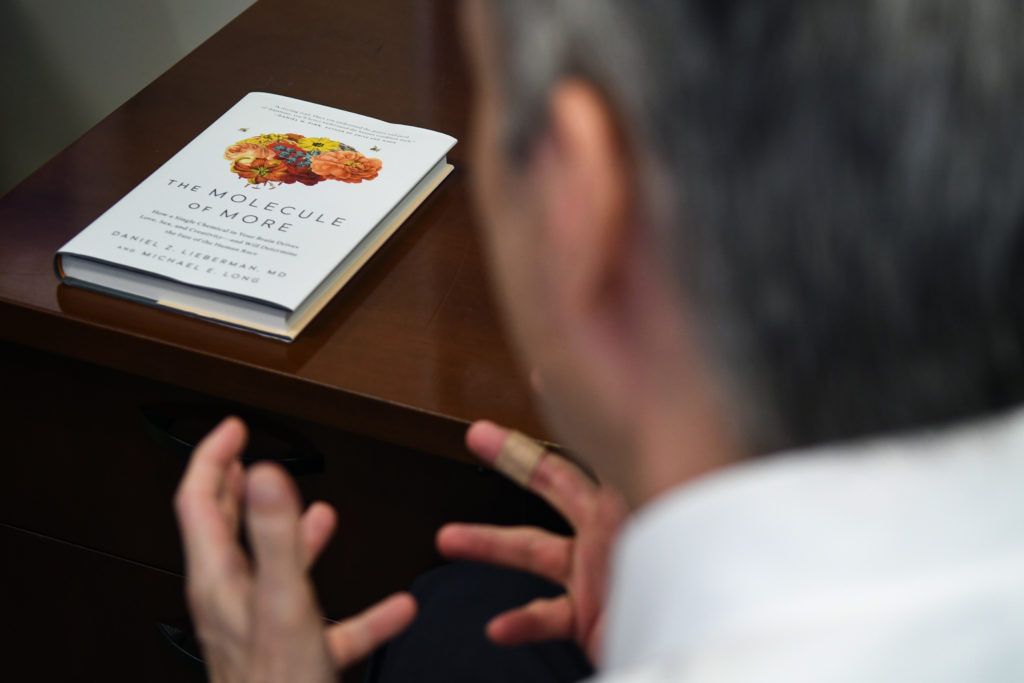For a brain chemical that controls everything from sexual desire to creativity, dopamine is misunderstood.
That fact led one professor to uncover the way the chemical works and write a book explaining its purpose so that the average person could understand.
Daniel Lieberman, a professor at the School of Medicine and Health Sciences and a practicing psychiatrist, released his book, “The Molecule of More,” last month, co-written by Michael Long, a professor at Georgetown University. Through 240 pages, the duo breaks down a scientific explanation of the ways dopamine dictates our feelings and desires with accessible anecdotes.
The Hatchet sat down with Lieberman to discuss his discoveries and correct misconceptions about the brain chemical that affects so much of our day-to-day lives. This interview has been edited and condensed for clarity.
How did the idea for this book come about?
Daniel Lieberman: When I was training to be a psychiatrist, I learned about a lot of different mental illnesses that all had to do with the chemical dopamine. The most famous one is addiction, but it also affects schizophrenia and ADHD. It occurred to me in passing, why is it that these very different illnesses could all be caused by problems with one single chemical? When I finally figured out what it was, I thought, this is so interesting, I have to write a book about this.
So what does this chemical actually dictate in your brain?
DL: When most people think dopamine, they think of pleasure and reward. When you eat delicious food, you get a burst of dopamine. When you experience sexual excitement, you get dopamine, when you listen to rock ‘n’ roll music and of course when you take drugs, you also get dopamine. But, it’s so much more than that. Dopamine is really the evolutionary solution to keeping us alive.
[gwh_image id=”1064291″ credit=”Graeme Sloan | Contributing Photo Editor ” align=”none” size=”embedded-img”]Daniel Lieberman, a professor at the School of Medicine and Health Sciences, discusses his new book.[/gwh_image]
What causes you to have that feeling of back and forth between wanting something and not?
DL: You have more than one dopamine circuit in your brain. There’s one dopamine circuit that goes for short-term pleasure, that’s the circuit that wants the donut, it wants the cigarette, it wants the line of cocaine. There’s another dopamine circuit that thinks farther off into the future. That’s the one that wants you to do your homework, it wants you to save money, and that’s the one that doesn’t want you to eat the donut.
Do some people release more dopamine than others? Who is more inclined to have a brain that releases more dopamine?
DL: It seems to be strongly influenced by genetics, some people are just born dopaminergic. Dopaminergic means a person characterized by dopamine traits. They’re only excited about things that they do not have. As soon as the thing they desire becomes a thing that they have, they lose interest.
The opposite are those who are very much in the present, and they appreciate small things. So they’re eating a meal, they’re tasting it, they’re smelling it. They’re happy with what they have.
As we age, we get less dopaminergic. We are a little less driven. When you are young, you have a ton of energy and motivation. You will go out, go to the clubs, meet people and have a great time. When you get a little older, you sit on the couch and watch Netflix and order a pizza.
Why has dopamine and mental health become a more prominent conversation in recent years?
DL: I think it’s because we live in a culture that is very much about more. We live in the technological age. Dopamine came about when humanity lived on the brink of starvation, and focusing our lives on getting more was absolutely essential for survival. Today, we’re still focusing our lives on getting more, but today not only is it unnecessary for survival – it’s actually an unhealthy thing.
What were some of the surprises in terms of your own understanding of dopamine that came through your research?
One of the chapters in the book is about politics, and it talks about how our genes influence our political ideology. The split is along the dopaminergic versus those existing in the here and now. When we talk about genetic influences, we tend to be talking about very small influences. You generally can’t see it in an individual. You need to get hundreds of people together and look at the averages. It’s small, but it’s there.
Who do you think this book will speak to?
DL: I think that some people are more introspective than others. Some just go through life and don’t really ask themselves: Why am I like this? Why did I act that way? This would be for people who are curious about their own behavior and those who recognize that they don’t always act rationally or in their own self-interest.




